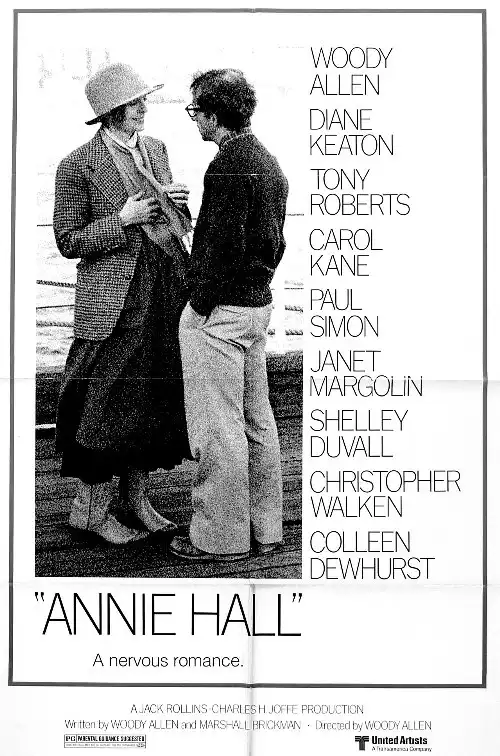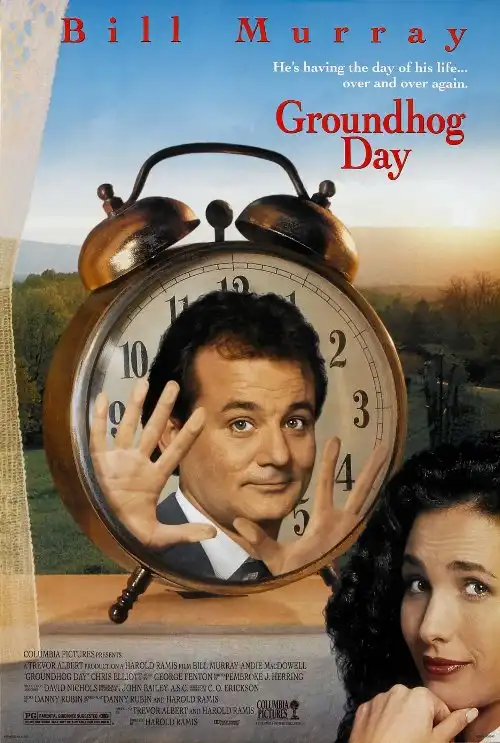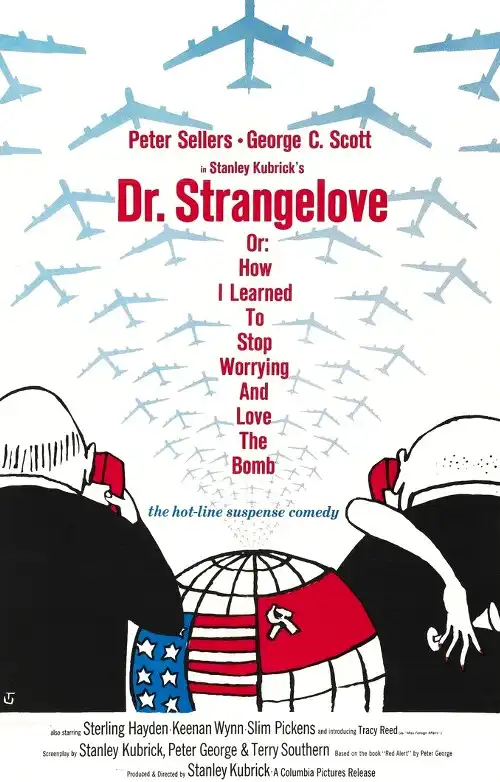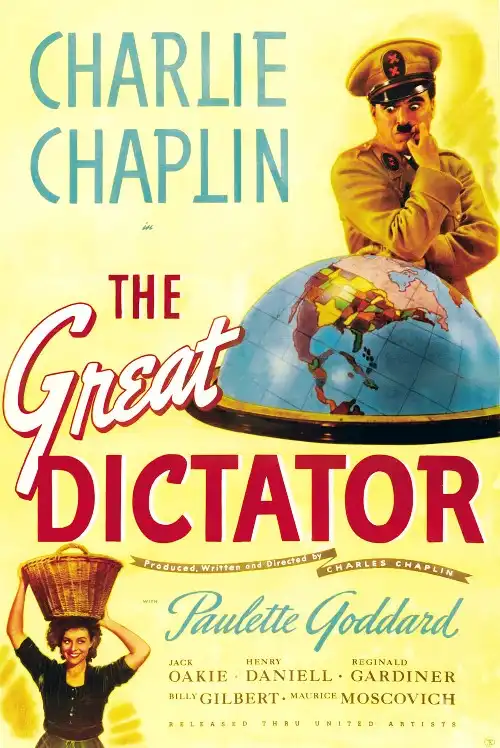Not That Funny Review of 101 Funniest Screenplays, by Stefan Stenudd
It's not that good an idea to have writers vote about the best writers. Their guild should avoid making their profession a competition. Also, writers are not the best to evaluate their work. It makes much more sense when that is done by their audience.
Standup MonologuesThe winner is the Woody Allen film Annie Hall (1977). That's just ridiculous. Woody Allen is a vastly overrated standup comedian who does little more than give a minimal setting for his monologues, which are not that funny to begin with.He has succeeded to get a reputation of being an intellectual joker, but scrutinizing his films reveal them as quite banal and the jokes are simple constructions on a limited theme.
The WGA highbrows must be very anxious, because Woody Allen also occupies spot 60 with Sleeper (1973), spot 69 with Bananas (1971), 76 with Take the Money and Run (1969), 78 with Love and Death (1975), 81 with Manhattan (1979), and 92 with Danny Rose (1984). That's seven out of 101! Interestingly, none is more recent than 1984, although he has made a bundle of movies since. Maybe even the highbrows are beginning to get tired of the same jokes over and over. But how could they ignore Radio Days (1987), one of the few Woody Allen films I truly enjoyed watching? It is a splendid mix of the two sentiments that make really good comedy: amusement and sadness.
Comedy Needs TragedyThere is something sad about comedy at its best. We look at how crazy the world is, how meaningless life really is, and all we can do is laugh. That is solace. Life stinks, but it is hilarious.Aristotle stated firmly that a story ending sadly is a tragedy and one ending well is a comedy. Both can be funny at times, but to him that's the basic rule. He may be right, although a good scriptwriter would make sure to challenge that definition as much as possible. So, good comedies tend to tell sad stories that just end sort of well, whereas good tragedies can be great adventures up to the bitter end. Of course, most dramas nowadays are not exactly tragedies, as Aristotle would have it, but stories playing wildly on every emotion. And Hollywood has a neurotic fear of sad endings, whatever direction the story is heading. Cowards. The catharsis Aristotle pointed out as the true function of any play, the sense of emotional release the audience feels afterwards, depends on a story being true to itself all the way to the end. If the end contradicts what preceded it, the audience will leave frustrated – even if it means the heroes of the story live happily ever after. With comedy, the Hollywood cowardice is more at place, since a happy ending is the rule. But that doesn't guarantee a satisfactory outcome. Also a comedy needs to end in accordance with the story told. No deus ex machina out of nowhere, fixing everything in the last minute. No conclusion pretending to solve problems that anyone can see are still very much present. I think the key to a good comedy ending is to have some bitterness remain in the happy outcome. A comedy needs to be kind of sad also at the ending scene. A smile, but also a tear.
Sweet SorrowThe movie script regarded as the second funniest by WGA is Some Like It Hot (1959). I'm not sure it fulfills the tragic criteria for comedy mentioned above. It is really a kind of slapstick – crazy scenes in quick succession, getting more and more burlesque.Sure, it is funny, and Marilyn Monroe's beauty makes an intriguing contrast to the other parodic types. But its lack of emotional depth makes it a passing experience with little resonance in the audience. We are entertained while the movie lasts, but then life goes on exactly as before. Well, that's pure comedy in the basic sense of the word. Just for fun. The third one on the list is something much more. Groundhog Day (1993) is a masterpiece of sadness, desperation and utter futility in the midst of the jokes. It is really a tragedy all the way to the end, which is in no way so happy that it compensates for the previous sorrows.
The fourth movie on the list, Airplane (1980), is a lighthearted pure comedy in line with Some Like It Hot, but without the lasting impression Marilyn Monroe was able to give. It's good for a quite few laughs, and that's it. Not bad, but far from enough to give it this high ranking. Next, though, is a tragedy masquerading as comedy: Tootsie (1982), where Dustin Hoffman's character goes through all kinds of humiliations. There is some humor involved, but really it's a tragedy – even though it is equipped with a happy ending, such as it is.
The Safe Bet of ParodyYoung Frankenstein (1974) on the sixth spot, on the other hand, is a comedy badly masked as a tragedy, well, even a horror story. It's a parody, of course, as are all Mel Brooks movies.It's not his best movie, nor is Blazing Saddles (1974) on the eighth spot. That would no doubt be The Producers (1967), occupying the twelfth spot. Again an overwhelmingly tragic story turned into comedy – and this one dares to end sort of sadly. That's probably exactly what makes it stand the test of time so well. It doesn't duck the ending it leads to. Parodies are rather safe bets when making comedy. They are convenient too, since the setting is already familiar to the audience. And laughs are easy to get by simply pointing out shortcomings of the genre treated. There are plenty of those in any genre. The ninth spot is occupied by a a brilliant example of parody: Monty Python and the Holy Grail (1975). It is easy enough to make fun with the ideals of gallant knights and such. Cervantes did so already in the 16th century with Don Quixote. Monty Python does it with commendable freshness and absurdity. It's not their best parody, though. That is no doubt Monty Python’s Life of Brian (1979), which is as far down the list as spot 26. This movie belongs to the classics, because it treats its subject-matter with insight and it dares to have a sad ending pretending to be a good one. That in itself is splendid comedy. The tenth movie on the list is National Lampoon’s Animal House (1978). It's a funny take on college fraternity, but hardly worthy of this high rank. Also, isn't it a parody on a comedy genre, which would make it kind of tautological? It's not proof of a great sense of humor to joke about something that is so much a joke as it is – and that goes for fraternities as well as adolescent attitudes to college life in general.
Serious ComedyA sad – even catastrophic – ending comes also to the second masterpiece on the list so far (Groundhog Day being the first), which is Dr. Strangelove or: How I Learned to Stop Worrying and Love the Bomb (1964). The title alone is hilarious as well as intimidating.Having the guts in the middle of the cold war, merely a couple of years after the Cuban Missile Crisis, to turn the imminent threat of total annihilation into a farce is daring to say the least. Not to mention having it end, after all the laughs, in total mayhem.
Any movie must have something to say, a message or a comment of some sort, worthy of reflecting. Comedies often neglect this rule, but that only makes them fade away into oblivion. That's unfortunate, since comedy is the very best instrument by which to attack the gravest of problems. Comedy has to be taken seriously. That is also done in M*A*S*H (1970), another satire about the absurdity of war. On the WGA list it only got to the 48th spot, which is a shame. Have American writers gotten far too used to war? It's not that they fail to see the comedy of it, since there are many movies on the list with much less humor – intended as well as accidental. They must be hesitant because of the gravity of the subject treated by the movie, mistakenly assuming that nothing so sad can be funny. That is probably why Good Morning, Vietnam (1987) is absent from the list.
Drama Not ComedyGlancing through the list I am struck by how many movies are not comedies at all, but dramas with some comedic aspects. I have stated above that a comedy is something very serious, which means that the story can or even should be sad, while the treatment of it is humorous – still not avoiding the sadness.But many of the movies on the WGA list are sort of humorous or amusing stories treated seriously. That's not comedy, but lightweight drama. Any drama also has some jokes. Have a look at Shakespeare, for example. That doesn't make it a comedy. For example, I would not call Annie Hall, the winner of the WGA vote, a comedy. Nor would Woody Allen, who has confessed intending to be quite serious with it. It's a drama with comedic ingredients. The same goes for the so much better second, Groundhog Day, also Tootsie although bordering on comedy with the slapstick twist to the story. When Harry Met Sally (1989) on the 15th spot is a drama, a sweet love story, which contains amusing dialogue and such, but not enough to make it a comedy. The emphasis is on the drama of the love story. The same can be said for The Graduate (1967) on spot 27, Harold and Maude (1971) on spot 49, Four Weddings and a Funeral (1994) on spot 53, and Shakespeare in Love (1998) on the last spot. There are many other movies questionably categorized as comedies. Being There (1979) on the 66th spot is a brilliant story about the impossible quest of finding meaning in life, and there are several moments making the audience chuckle. But it's a tragedy. I also have my doubts about calling the grim story of Fargo (1996) on spot 86 a comedy. Well, the borders between genres are vague and some of the most interesting movies are made right on those borders. That's all fine. The problem comes with the title of the WGA list: “101 Funniest Screenplays.” I would not really call some of the movies mentioned above funny. Mostly, they are sad – or plain ridiculous in far too many cases. But funny?
Funny OldiesIf we are talking funny, the Marx brothers quickly come to mind. Talk about hilarious! But they only have two movies on the list: Duck Soup (1933) on spot 17 and way down on spot 38 A Night at the Opera (1935). Probably, the members of WGA are not that familiar with the earlier decades of movie history.That's confirmed by Charlie Chaplin not appearing until spot 82, with the absolute film classic Modern Times (1936). Two more of his films are on the list: City Lights (1931) on spot 90 and The Gold Rush (1925) on 94, which is the oldest movie on the list. Surely, he deserves better rating than that. And why not The Great Dictator (1940), the bitterly tragic comedy comparable in style and message to Dr. Strangelove? Just the dance he does with a globe merits the film for a high spot on the list.
How quickly they forget. There are only two movies on the list from the 1920s. 14 of the movies are from our present millennium. The real bulk is at the late 20th century, especially the 1980s with 29 of the movies. Second is the 90s with 18 movies and then the 70s with 15. So, these three decades have 62 of the 101 spots. I would not say that the 1980s is the most funny of the past decades, neither in the movies nor elsewhere. The 60s, being a so much more lively and interesting decade, only got eight of the 101 spots. That reveals the mean age of the WGA members – well, those that bothered to vote. It's what happens when there are polls to decide “the best ever” of just about anything. It depends on the mean age of the voters. Still taking such polls seriously is kind of funny.
Stefan Stenudd November 13, 2015
More Reviews
About CookiesMy Other WebsitesCREATION MYTHSMyths in general and myths of creation in particular.
TAOISMThe wisdom of Taoism and the Tao Te Ching, its ancient source.
LIFE ENERGYAn encyclopedia of life energy concepts around the world.
QI ENERGY EXERCISESQi (also spelled chi or ki) explained, with exercises to increase it.
I CHINGThe ancient Chinese system of divination and free online reading.
TAROTTarot card meanings in divination and a free online spread.
ASTROLOGYThe complete horoscope chart and how to read it.
MY AMAZON PAGE
MY YOUTUBE AIKIDO
MY YOUTUBE ART
MY FACEBOOK
MY INSTAGRAM
MY TWITTER
STENUDD PÅ SVENSKA
|
 Ever Young
Ever Young



